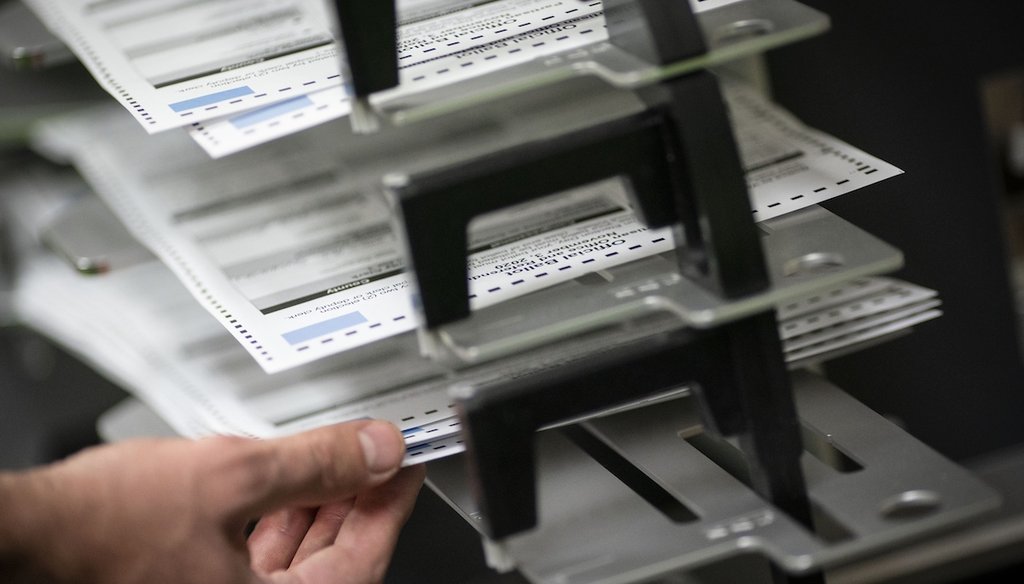



Poll workers sort out early and absentee ballots at the Kenosha Municipal building on Election Day on Tuesday, Nov. 3, 2020, in Kenosha, Wis. (AP Photo/Wong Maye-E)
Elections in America are governed by three different levels of government: federal, state and local
While the state sets various rules -- such as for voting hours and identification requirements -- the actual election operation is handled at the local level.
That’s where poll workers are hired, polling locations are run, and votes are tallied.
A year after the 2020 election, the presidential results in Wisconsin are still being argued about, despite a recount and court rulings confirming that Democrat Joe Biden won the state by about 20,000 votes -- a key win that helped him oust Donald Trump as president.
The latest wrinkle in the debate: Just who runs elections.
Consider this recent exchange on Twitter:
In a series of tweets on Oct. 26, 2021, Dane County Clerk Scott McDonnell expressed frustration over one of the ongoing GOP-led reviews, in which investigators wanted to handle ballots, despite not being election officials. McDonell detailed the chain of custody of ballots, and how local officials are the only ones who are supposed to handle them, so an uncompromised record remains.
In response, the Senate Republicans tweeted: "Dear Scott McDonell. States run elections, not the federal government."
So who does run elections?
It turns out, elections aren’t really "run" by either.
Barry Burden, director of the Elections Research Center at the University of Wisconsin-Madison, said the administration of elections is more like a "marble layer cake" of different entities that do and require different things.
The federal government does have some degree of control over elections. There are parameters laid out in federal laws and documents like the U.S. Constitution, Burden said.
For example, the presidential election is always held on the same day of the same month -- the first Tuesday in November -- for every state.
States, meanwhile, can set their own laws governing how elections are run, within the parameters of federal laws. States do things like set the time, date and manner of their own elections. They also can institute rules about when voters can register, how and when absentee ballots can be submitted and what sorts of identification is required for voters.
But local government is where the primary functions of an election take place: County and municipal clerks are the ones registering voters, dealing with absentee ballot requests, mailing out ballots, setting up polling places, testing voting equipment, hiring poll workers and then actually tabulating votes on election night.
"That’s running elections, in a way, but I would call it administering to keep clear what’s going on," Burden said, in reference to the role of local governments. "That’s actually the physical handling of the election itself. But in terms of the rules of the election, or the parameters of it, there are a bunch of different levels of government involved."
So when it comes down to it, saying that either the federal government or the state government "runs" elections isn’t exactly right, though they both play a role.
"It’s just not the right way to conceive of it," said Burden. "It’s everybody. All those levels of government have a role to play."
Indeed, some of the primary complaints Republicans have cited over the November 2020 election relate to how local officials ran their election operations last year. So, that in itself is at odds with the claim that it’s the states that solely run an election.
In a Twitter retort, Wisconsin Senate Republicans claimed that the state runs elections, not the federal government.
The tweet had no mention of local levels of government, where the bulk of the work on and before Election Day plays out -- and where the critical task of counting and certifying local totals takes place.
Elections are actually governed and managed at the federal, state and local levels, which means they aren’t really "run" by any one part of the government. That said, the state clearly does play an important role in setting the rules for elections.
We rate this claim Mostly False.
Wisconsin Senate Republicans, Twitter, Oct. 26, 2021
Conversation with Barry Burden, director of the Elections Research Center at the University of Wisconsin-Madison, Oct. 29, 2021
In a world of wild talk and fake news, help us stand up for the facts.
